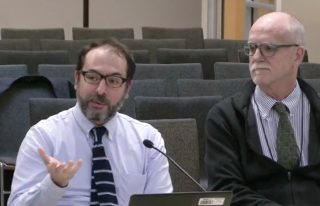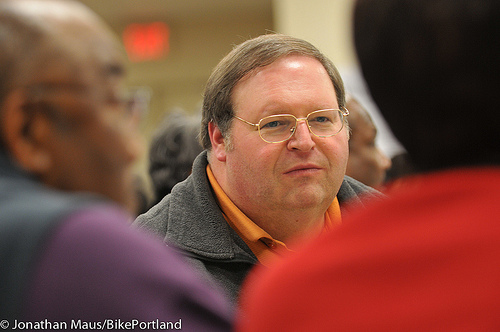Noted transportation activist and Portland Planning and Sustainability Commissioner Chris Smith made a bold move Tuesday night that could have thrown a wrench in the works the State of Oregon’s top transportation priority.
Smith put forward a motion at a work session meeting of the Planning Commission that would have taken the I-5 Broadway Weidler Facility Plan out of the City of Portland’s Transportation System Plan. The TSP is Portland’s road investment guidebook and any major project that wants funding must be listed in it. As we reported yesterday, this $450 million (estimated) project is one of three freeway mega-projects lined up to receive significant funding in the transportation package currently being negotiated in Salem.
Smith was the sole PSC Commissioner to vote against the project when it was passed as part of the N/NE Quadrant Plan (a component of the Central City 2035 Plan) back in 2012. Judging from his pointed remarks about the project Tuesday night, he still hasn’t warmed up to the idea.
“There are a huge number of good things this plan does and I don’t dispute that. But neither can I ignore that the first thing it does is that it makes driving easier.”
— Chris Smith, Planning Commissioner
While this is ODOT’s project, the City of Portland is a key partner and full-throated supporter. Why would Portland support a freeway-widening project in the heart of our dense, growing, city? As we reported yesterday about half the project’s price tag would fund surface streets adjacent to the freeway. Not only would PBOT get millions for local improvements, they’d get a hall-pass in the form of what’s known as a Multimodal Mixed-use Area designation (MMA) from ODOT allowing them to re-zone the area for even more growth — even if that growth leads to congestion on the freeway system. Without the MMA in hand, ODOT could prevent the City from development unless they could prove it wouldn’t clog freeways (something that has already happened in the Central Eastside and South Waterfront).
After hearing a presentation on the project from PBOT Transportation Planner Mauricio Leclerc and Bureau of Planning and Sustainability Chief Planner Joe Zehnder, Smith introduced his motion to strip it out of the TSP and then delivered an impassioned speech to explain himself. With 10 members present, Smith would need to find five commissioners to support his idea.
“I don’t dispute anything Mauricio and Joe just said,” Smith opened. “And I still think this is a terrible idea.”
Smith said a lot has changed since the PSC last took a close look at the project. Since then, he pointed out, they adopted an update of the Climate Action Plan and the Comprehensive Plan. Both of those, Smith reminded his fellow PSC members, “Makes the point that we need to be reducing the amount of driving in the City of Portland.” He also brought up the recent vigorous debates about fossil fuels. “We went from debating a propane terminal, to essentially stopping the expansion of fossil fuel infrastructure in Portland… We have doubled-down on our carbon reduction strategies.”
Given that, Smith said, it makes no sense that the $450 million I-5 Broadway-Weidler project — which would be the largest single public investment in the Comprehensive Plan — “Has as its core purpose making driving easier.”
Even though the plan would improve bicycle access and build lids over I-5 where new public spaces could flourish, Smith added, “I can’t ignore that the first thing this project does is makes driving easier.”
Here’s an excerpt from his speech:
“I want to contrast the scale of investment. We had a two-year long debate about getting the citizens of Portland to approve a gas tax that will provide $64 million over four years. But somehow ODOT is going to spend almost ten times that much for things that are not the core policies that we have put in the Comp Plan and Portland Plan?
And I think perhaps the most discordant thing for me is how this fits into Vision Zero. We have adopted a focus that our key priority for the transportation system is to stop killing people. We killed 45 people on our streets last year: None of them died on this stretch of the freeway. We don’t kill people on this stretch of the freeway. We do kill people regularly on the orphan highways that ODOT is responsible for; but ODOT is not choosing to invest in 82nd or outer Powell. We’ve been told, ‘Well, we’re going to apply for grants to finish outer Powell and bit-by-bit we’re going to get it done.’ But somehow a half billion dollars is going to materialize to make driving easier in the middle of the central city.
What I know is that if you live east of I-205 you are 2.5 times more likely to die in traffic than if you live west of I-205. But the number one thing we’re going to invest in is to make driving easier on a piece of freeway? That is a massive misallocation of resources, it’s not in alignment with our policies that we have worked on very hard here with the Portland Plan and the Comp Plan and we shouldn’t send the signal that we’re going to go-along to get-along and do it. That’s why I’m making this motion.”
Advertisement
While Smith isn’t having any of it, PBOT feels that adding lanes to I-5 is a worthy trade-off for the other elements of the project. “This is an innovative project that really makes a freeway project something that is about place-making and that improves conditions for all modes,” Leclerc said during his presentation. In addition, Leclerc sees the potential funding of this project as PBOT’s best chance to improve safety for bicycle riders and other road users on the notorious Broadway corridor. “You could even say that taking this project out [of the TSP] may hurt Broadway as a high-crash corridor because, how else are we going to fix those five bridges over the Rose Quarter now, unless we come up w $200 million ourselves.”

The impact of removing the projects from the TSP would be very real. It would create chaos and outrage among the numerous powerful business and freight interests across Oregon who all agree “fixing the bottleneck on I-5” needs to happen ASAP. It would also put PBOT out of compliance with the Regional Transportation Plan and force them to either have City Council adopt an ordinance to add it back in, or PBOT would have to make their case to regional leaders that it no longer deserves to be there.
When it came time to discuss the motion at the PSC meeting on Tuesday, several commissioners expressed they were uncomfortable with doing such an about-face on the process. Others said striking this project out of the TSP would make Portland appear very disrespectful and tone-deaf to statewide interests.
“Even though Portland has different ideas about how dollars are spent, we are part of a statewide and regional economy and I think we’d be doing a disservice to that partnership to not recognize the value other people see in this project even though it doesn’t fit all the criteria we want to impose on a transportation project.”
— Jeff Bachrach, Planning Commissioner
PSC Commissioner Jeff Bachrach said he felt the move “Would be a very dramatic action” for the commission. “It would send a lot of ripples out… and City Council wouldn’t appreciate that.” Bachrach said PSC should have brought this up sooner and hosted a public hearing to air these concerns. “I think you came up with this too late Chris.” Bachrach also said he sympathizes with perspectives outside of Portland and has heard from Washington County business owners who complain that the congestion on I-5 is hurting their bottom-line. “They weren’t concerned about Vision Zero… But they are very concerned about this bottleneck,” Bachrach added, “Even though Portland has different ideas about how dollars are spent, we are part of a statewide and regional economy and I think we’d be doing a disservice to that partnership to not recognize the value other people see in this project even though it doesn’t fit all the criteria we want to impose on a transportation project.”
In response to Bachrach’s concerns about freight, Smith said he too wants freight to move more freely. “I just wish we’d stop investing for freight in facilities that will be 90% used by SOVs [single occupancy vehicles]. The best thing we can do for freight is a congestion pricing scheme because the economic value of freight will be happy to pay tolls that will keep the SOVs off the road.
“I’m not going to have a policy debate with you,” Bachrach shot back, “I’m not defending these businesses, I’m just saying before we diss these regional partners we should be aware about how important it is to them.”
Commissioner Gary Oxman also said he wouldn’t support Smith’s motion because he was, “Concerned about the process issues and very concerned about the relationship of Portland with the rest of the state.”
Commissioner Michelle Rudd said she too didn’t want to get in the way of the process.
Smith feels the process would be improved if his motion passed. “I believe that by taking these projects out of the TSP we create the best possible debate at City Council,” he explained. The process of putting them back would create an opportunity for a broader public debate about the project. One that Smith says hasn’t happened yet. “Then we can have the kind of focus that I think will bring out the citizens of Portland — as the Pembina project did — to talk about their values related to climate change.”
Leclerc from PBOT countered that there will be plenty of “council moments” in the future where a debate can happen, “Before this is something that becomes implementable.”
The fear with large highway projects like this is how they get stronger with each step in the funding process. Boosters often say there will be chances for debates in the future, but meanwhile the project gets so much momentum from these supposedly small steps that they can’t be stopped.
Saying the way this project has moved forward reminds him of the Columbia River Crossing Project, PSC Commissioner Eli Spevak said, “I think some of Portland’s most important decisions are transportation projects we didn’t do. And this might be one of them.”
In the end, Smith’s motion failed by a vote of 6 to 4 (with one commissioner absent). He was supported by commissioners Katie Larsell, Mike Houck, and Eli Spevak. Reached via email after the meeting, Smith said he was frustrated that he couldn’t manage one more vote, “But it was a good discussion and certainly big progress from 2012.” Who knows what will happen when — or if — this project comes up for a vote again.
You can watch the meeting on YouTube. The PBOT/BPS presentation starts at 15:18 and Smith introduces his motion at around 43:25.
— Jonathan Maus: (503) 706-8804, @jonathan_maus on Twitter and jonathan@bikeportland.org
BikePortland is supported by the community (that means you!). Please become a subscriber or make a donation today.



